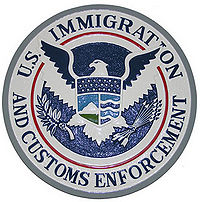Immigration And Customs Enforcement
 From Conservapedia
From Conservapedia United States Immigration and Customs Enforcement (ICE) is a federal law enforcement agency under the United States Department of Homeland Security, responsible for enforcing U.S. immigration and customs laws. It is the largest investigative agency in the U.S. Department of Homeland Security and the second largest investigative agency in the U.S. federal government.
Created in 2003 through a merger of the investigative and interior enforcement elements of the U.S. Customs Service and the Immigration and Naturalization Service, ICE now has more than 20,000 employees working in 400 offices in all 50 states and 47 foreign countries. The agency has an annual budget of more than $5.7 billion, primarily devoted to its two principal operating components - Homeland Security Investigations and Enforcement and Removal Operations.
The agency's law enforcement authorities encompass more than 400 U.S. federal statutes that ICE is responsible for enforcing in its commitment to ensuring national security and public safety.[1]
Organization[edit]
ICE comprises three integrated operational directorates:
- Homeland Security Investigations (HSI): HSI comprises ICE's offices that are primarily devoted to criminal investigation, which includes the Office of Investigations, Office of Intelligence and Office of International Affairs. This directorate has responsibility for ICE's national security programs and ICE's investigative authority over criminal violations of U.S. law relating to illicit trade, travel, immigration and finance. In addition, HSI investigates violations of employment verification laws and visa violations in the U.S. and abroad.
- Enforcement and Removal Operations (ERO): ERO comprises the ICE offices that are primarily devoted to civil immigration enforcement, namely the Office of Detention and Removal Management and the Secure Communities program. This directorate ensures a coherent and consistent approach to civil immigration enforcement in a manner that prioritizes convicted criminals, fugitives and illegal re-entrants, and recent border violators. ERO also oversees the agency's detention system, removal flight operations and efforts to locate aliens subject to criminal prosecution for illegal re-entry.
- Management and Administration (MA): MA comprises the Offices of the Chief Financial Officer, the Chief Information Officer, Human Capital, Acquisition Management, Policy, Privacy, Training and Development, National Firearms and Tactical Training Unit, Freedom of Information Act, the Chief Diversity Officer and Equal Employment Opportunity. These offices support the missions of HSI and ERO and provide sound agency management. The directorate oversees management of ICE's budget, expenditure of funds, accounting and finance, procurement, human resources and personnel, workforce recruitment, equal employment opportunity, information technology systems, facilities, property, equipment, and the identification and tracking of performance measurements.
Leadership Offices[edit]
The following leadership offices are located within the ICE director's office:
- ICE Reporting Operations Center/National Incident Response Unit (IROC/NIRU): The IROC/NIRU is the agency's "nerve center," overseeing key operational communication functions, and crisis planning and response efforts.
- Office of Congressional Relations (OCR): OCR provides liaison services to members of the U.S. Congress and their staffs to promote awareness and understanding of ICE operations, national and local programs, policies and initiatives.
- Office of Detention Policy and Planning (ODPP): The Office of Detention Policy and Planning (ODPP) is responsible for leading ICE's effort to overhaul the current immigration detention system.
- Office of the Principal Legal Advisor (OPLA): OPLA provides legal advice, training and services to support the ICE mission and assists in defending the interests of the United States in administrative and federal courts. OPLA prosecutes immigration and customs law violators both in U.S. Immigration Courts and federal courts as special assistant U.S. Attorneys. OPLA's work is focused on those who threaten the safety of our citizenry.
- Office of Professional Responsibility (OPR): OPR is responsible for investigating allegations of misconduct involving employees of ICE and U.S. Customs and Border Protection (CBP). OPR also provides independent reviews of ICE programs and offices, adjudicates ICE background investigations, and issues security clearances for all prospective and current ICE employees and contract staff.
- Office of Public Affairs (OPA): OPA is the agency's public face, dedicated to telling the ICE story and building understanding of and support for the ICE mission through outreach to employees, the media and the general public. OPA strives to maintain consistency, accuracy and credibility in the agency's communication efforts.
- Office of State/Local Coordination (OSLC): OSLC fosters partnerships with ICE's law enforcement counterparts to ensure the safety and security of our homeland through education and cross-designation. OSLC has instituted ICE ACCESS (Agreements of Cooperation in Communities to Enhance Safety and Security), an umbrella of services offered for assistance to local law enforcement officers to combat specific challenges in their communities.
See also[edit]
References[edit]
Categories: [United States Government] [United States Department of Homeland Security] [Law Enforcement Agencies]
↧ Download as ZWI file | Last modified: 03/03/2023 11:11:53 | 23 views
☰ Source: https://www.conservapedia.com/Immigration_and_Customs_Enforcement | License: CC BY-SA 3.0
 ZWI signed:
ZWI signed:
 KSF
KSF